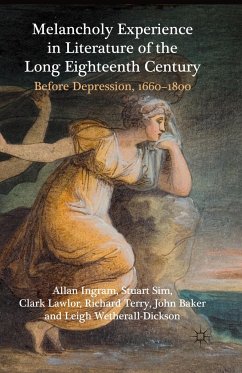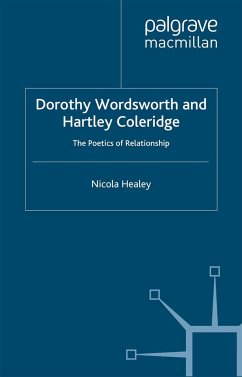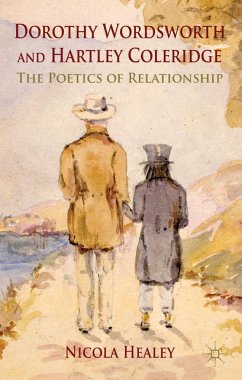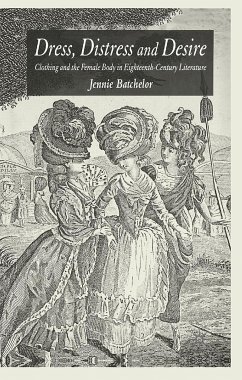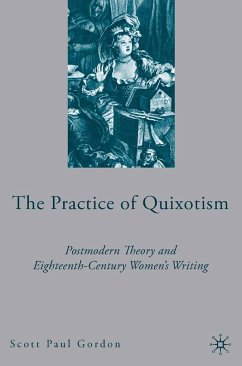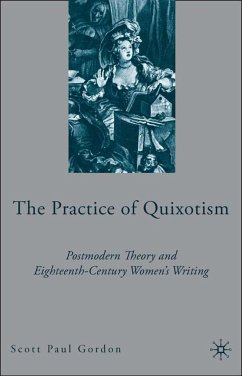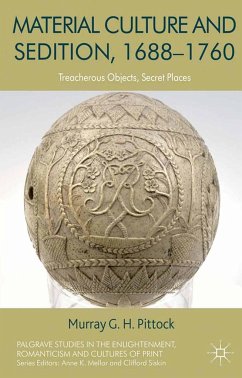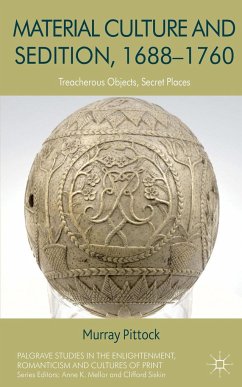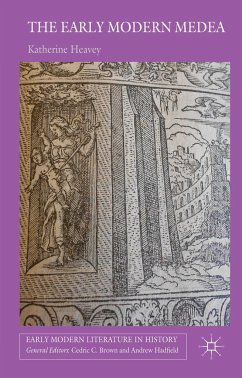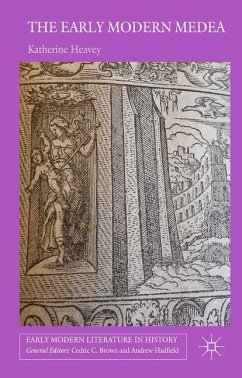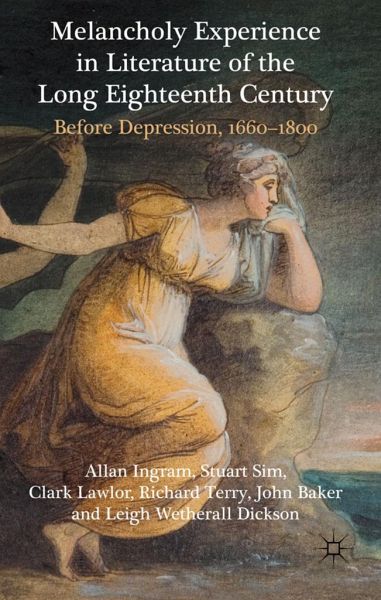
Melancholy Experience in Literature of the Long Eighteenth Century
Before Depression, 1660-1800
Versandkostenfrei!
Versandfertig in 6-10 Tagen
Weitere Ausgaben:

PAYBACK Punkte
19 °P sammeln!





Arising from a research project on depression in the eighteenth century, this book discusses the experience of depressive states both in terms of existing modes of thought and expression, and of attempts to describe and live with suffering. It also asks what present-day society can learn about depression from the eighteenth-century experience.
ALLAN INGRAM is Professor of English at the University of Northumbria, UK. He has published widely in the field of eighteenth-century studies and particularly on literature and madness. He was Director of the Leverhulme Trust 'Before Depression' project. He is co-general editor and volume co-editor for the forthcoming Depression and Melancholy 1660-1800 set (Pickering & Chatto, 2012). STUART SIM is Visiting Professor of Critical Theory and Long Eighteenth-Century English Literature in the Department of English and Creative Writing, University of Northumbria, UK. He has published widely in his two main subject areas. A co-editor and founder-member of the journal Bunyan Studies (1988- ), he was elected a Fellow of the English Association in 2002. CLARK LAWLOR is Reader in English Literature at the University of Northumbria, UK, and has published many works on literature and medicine - including Consumption and Literature: The Making of the Romantic Disease (Palgrave, 2006), which was shortlisted for the European Society for the Study of English book prize 2006-8. At present he is writing Depression: The Biography (Oxford University Press, 2011). RICHARD TERRY is Professor of Eighteenth-Century English Literature at University of Northumbria, UK, having worked for many years at the University of Sunderland. He has published extensively on eighteenth-century poetry and on mock-heroic as a literary device and form. JOHN BAKER is Maître deconférences (Senior Lecturer) in English at the Université Paris 1 Panthéon-Sorbonne, France. He has published in French and English on themes associated with the writings of Edward Young and the Night Thoughts, and more generally on poetry of the eighteenth century. LEIGH WETHERALL-DICKSON is Senior Lecturer in Eighteenth- and Nineteenth-Century English Literature at University of Northumbria, UK and began her career there as a post-doctoral Research Associate on the Leverhulme-funded 'Before Depression 1660-1800' project. She is currently involved as co-general editor and volume editor for the forthcoming Depression and Melancholy 1660-1800 set (Pickering & Chatto, 2012).
Produktdetails
- Verlag: Palgrave Macmillan / Palgrave Macmillan UK / Springer Palgrave Macmillan
- Artikelnr. des Verlages: 978-0-230-24631-7
- 2011 edition
- Seitenzahl: 246
- Erscheinungstermin: 12. April 2011
- Englisch
- Abmessung: 218mm x 140mm x 23mm
- Gewicht: 408g
- ISBN-13: 9780230246317
- ISBN-10: 0230246311
- Artikelnr.: 33253552
Herstellerkennzeichnung
Libri GmbH
Europaallee 1
36244 Bad Hersfeld
gpsr@libri.de
'The studies that make up Melancholy Experience show how integral and dynamic medical and literary writing can be when read together. Judiciously chosen texts from a range of genres, by major figures and anonymous authors, demonstrate the wealth of perspectives offered by the history of melancholy on such topics as sex, religion, and creativity, as well as the condition itself. The book maintains a sense of conviction that the records left by sufferers and those who cared for them in the long eighteenth century are valuable for those who suffer now and those who wish to help. It is a fine example of such cross-era juxtaposition done conscientiously and constructively. Perhaps the strongest and most unique feature of this work is the humaneness of its scholarship, which causes the reader to share the deep interest and compassion the authors evidently feel for their subjects.'
- Tristanne Connolly, Assistant Professorof English, St. Jerome's University, University of Waterloo, Canada
'Offering excellent insight into what the eighteenth century can teach us in terms of treatment of depressive states, it will be of great value not only to eighteenth-century scholars and students, but to all persons with an interest in the workings of the human mind and its disorders.' Miranda Journal
'...this is a valuable and highly varied volume...' - Review of English Studies
- Tristanne Connolly, Assistant Professorof English, St. Jerome's University, University of Waterloo, Canada
'Offering excellent insight into what the eighteenth century can teach us in terms of treatment of depressive states, it will be of great value not only to eighteenth-century scholars and students, but to all persons with an interest in the workings of the human mind and its disorders.' Miranda Journal
'...this is a valuable and highly varied volume...' - Review of English Studies
Für dieses Produkt wurde noch keine Bewertung abgegeben. Wir würden uns sehr freuen, wenn du die erste Bewertung schreibst!
Eine Bewertung schreiben
Eine Bewertung schreiben
Andere Kunden interessierten sich für




